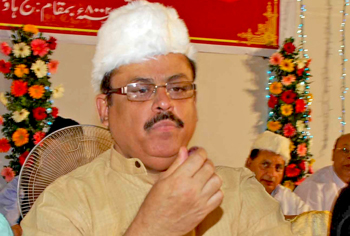 Nagpur, Aug 31: Nationalist Congress Party general secretary Tariq Anwar has accused the BJP-led government at the centre of fanning communal passions in the country just to polarize voters on basis of religion before elections in five states. "But the voters are seeing through this game plan of the BJP and have shown in recent by-elections in Bihar that they would prefer secularism to communalism," said Anwar.
Nagpur, Aug 31: Nationalist Congress Party general secretary Tariq Anwar has accused the BJP-led government at the centre of fanning communal passions in the country just to polarize voters on basis of religion before elections in five states. "But the voters are seeing through this game plan of the BJP and have shown in recent by-elections in Bihar that they would prefer secularism to communalism," said Anwar.
In the recent Lok Sabha elections Anwar got elected from Bihar even as the party along with ally Congress fared poorly all over the country. "But remember, the BJP has won only 31% of the total votes polled in Lok Sabha. It could get a majority because of vote-split that decimated the parties with secular credentials. This was more of fluke and recent by-poll results in Bihar showed that if the secular parties are united, they can easily take on the BJP.
"In any case, the public disillusionment with Narendra Modi is growing very fast. More so with the general direction in which the Modi government is moving and the fact that in its first 100 days the NDA government failed to fulfil the prime election promise of controlling prices of essential commodities," said Anwar. However, he agreed that 100 days was too short a time to judge the Modi government.
"The indications and general drift of the Modi regime are dangerous for democracy in the country. It is clear that he does not want any opposition in the way of his running the government. His dictatorial style of function, in which he does not brook dissent even from party leaders, does not auger well for the country," said Modi.
Anwar, who was in the city en route from Amravati where he had some social and party engagements, told media-men here that there was serious threat to communal harmony under Modi. "The clear majority that BJP got in general elections is being used as licence by the RSS and the saffron organizations to ride roughshod in the country and do whatever it wants. This attitude is in total contrast to the Atal Bihari Vajpayee government which consciously avoided all controversial issues.
"But the Modi government wants to create communal divide for political gains. It has not given any representation to the minorities as not even a single Muslim or Christian candidate was elected on the BJP ticket. Actually, this is his notorious Gujarat model that he wants to replicate on the national scale. He wants to decimate his opponents totally within and outside the government. But without any Opposition, the democracy will suffer," said Anwar.
When pointed out that the new government has already put the country's economy on growth track clocking a quarterly 5.7 GDP, which is the highest in last 30 months, Anwar dismissed this as window dressing quite different from ground reality where the poor continue to suffer and are not touched by the 'India Shining' picture presented by the BJP.
Anwar, who only recently vacated Rajya Sabha seat from Maharashtra yielding place to party colleague Praful Patel in parliament, said the NCP was keen on finalizing seat-sharing pact with the Congress based on the 2014 Lok Sabha poll outcome in which the NCP had fared better than the Congress in the state. "We are hopeful of sealing the deal with the Congress in next few days. We are firm on contesting 144 seats and hope Congress will agree to it," said the NCP leader who categorically ruled out any chances of the Congress and the NCP merging into one. "It is too late for that thought as the NCP has established its own identity and its style of functioning differs though we share common ideology with the Congress," he said. He tried to dismiss the charges of corruption that many of his party leaders face in Maharashtra. He was confident that the NCP-Congress alliance would retain power in state after elections that are likely to be held in October.





Comments
Add new comment